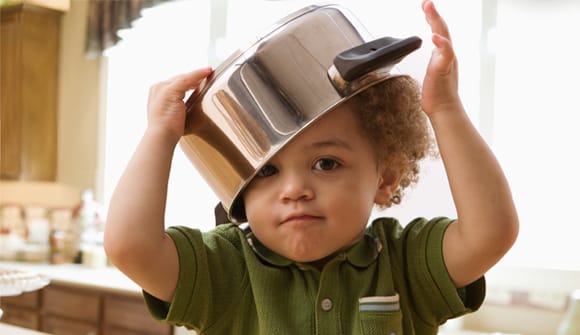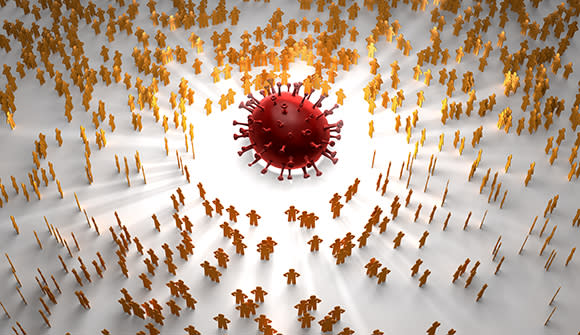Boxes, bowls and bedding
Household items that support your child’s development more than a screen.
Article Author: Guest Columnist
Article Date:

As a pediatric physical therapist and also a mom, I understand how turning on the TV and allowing your little one to get engaged in a TV show may give you some peace or allow you to get something done in the house. This is especially true during COVID-19, when so many moms and dads are working from home and just need a little quiet. But there are a few simple things you probably already have in your house you can use to keep your little one engaged while actually supporting their cognitive and physical development.
Cardboard boxes
We all have an Amazon box or diaper box lying around somewhere. Boxes are perfect for little ones to pull up on and practice standing (parents should hold the opposite side of the box to avoid tipping), and to place objects on top of and play with, which helps hone their fine motor control. Depending on the age of your child, you may want to first decorate your box to practice writing, coloring and imitation skills.
Your child can also use the box to crawl through or make a fort. Once completed, it can become part of an obstacle course where you challenge your child to follow multi-step directions, and challenge their balance by incorporating stepping over pillows. It can also be used to play peek-a-boo with your little ones. A box can be so much fun!
Pots, pans and plasticware
With older children, you can invite them to help you cook or bake. For the littles, they can stack plasticware in the kitchen floor, use them as instruments, build with them, and figure out which top goes on which bottom. You can also make a slit in the one of the tops and have them place coins in the Tupperware container. Of course, coins can be a choking hazard should little ones put them in their mouths, so this should always be done with close supervision. And when dinner and playtime are done, they can help clean them and put them away. This all contributes to hand-eye coordination, overall strength and finger strength.
Laundry time
Most toddlers work hard to get our attention when we’re trying to fold the laundry. Depending on the age of your child, he or she can help with sorting the socks to work on matching skills. For toddlers, you may want to have them help to hand you items from the dryer or place them in the laundry basket, which supports standing, sorting, trunk rotation and balance control. Once you fold the socks, you can make a throwing game by having them toss the socks into the designated drawer. They can do this sitting or standing. This activity works on shoulder strength, hand-eye coordination, trunk strength and trunk rotation.
Pillows
Standing on pillows to play catch helps improve balance, while crawling over them improves balance as well as arm strength. Even sitting on them and playing with toys or reading a book can improve balance.
Mirrors
Handheld or wall-mounted mirrors are great for playing a game of peek-a-boo or practicing imitation. You can also lay mirrors on the ground for your little one to play on with whipped cream or shaving cream. With older children, you can play games like tic-tac-toe using an old dry erase marker.
Music
Many of the same devices we watch shows or videos on can also play music, which doesn’t keep kids so glued to the screen. Check your favorite streaming services or Google for kid-friendly songs. You can play stop-and-go, Simon says, and imitate the way animals walk (like a bear, crab, dog or snake). All of these activities will help your child with following directions, imitation, motor planning and improving strength.
Our guest columnist is Suzanne Barje, PT, a pediatric physical therapist and system manager for Wolfson Children’s Rehabilitation.
If your child is having difficulty with any of these developmental skills, call 904.202.4200 to make an appointment with Wolfson Children’s Rehabilitation. Pediatric therapists offer treatment for developmental delays, fine or gross motor challenges, acute or chronic medical conditions and more.



